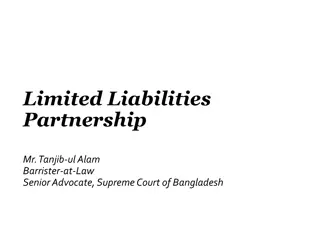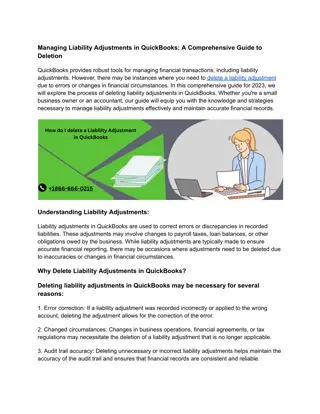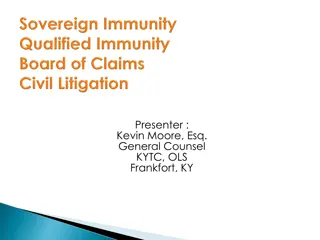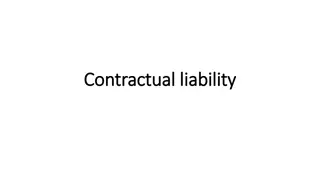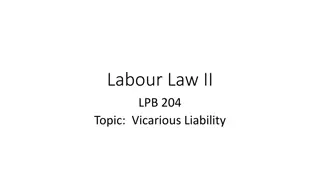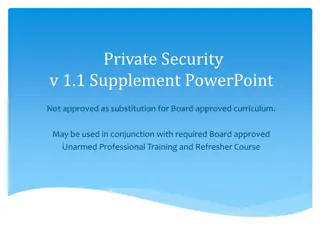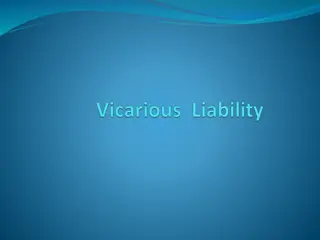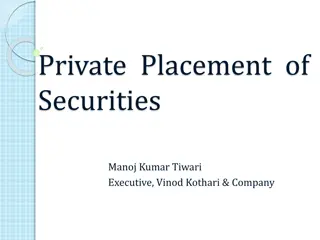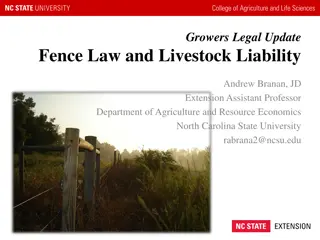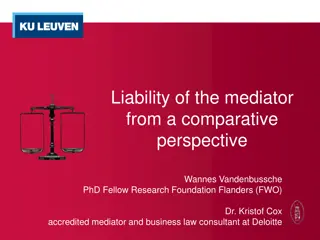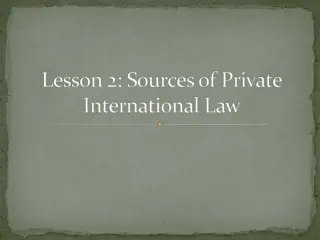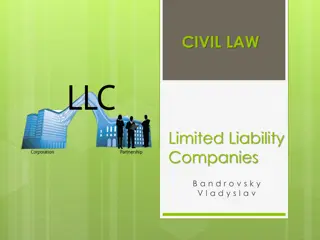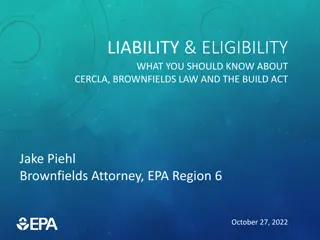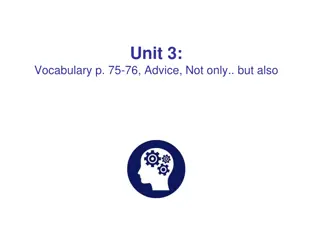Private Security Training: Law, Regulations, and Civil Liability
Covering a range of essential topics, this training presentation delves into private security regulations, civil law torts, limited authority of private citizens, citizens' arrests, and the role of private security professionals as agents of law enforcement. Understanding these concepts is crucial for those in the private security sector to navigate legal boundaries and fulfill their duties effectively.
Download Presentation

Please find below an Image/Link to download the presentation.
The content on the website is provided AS IS for your information and personal use only. It may not be sold, licensed, or shared on other websites without obtaining consent from the author. Download presentation by click this link. If you encounter any issues during the download, it is possible that the publisher has removed the file from their server.
E N D
Presentation Transcript
Private Security v 3.0 Supplement PowerPoint Not approved as substitution for Board approved curriculum. May be used in conjunction with required Board approved Unarmed Professional Training and Refresher Course
Introduction Law Current Trends Active Threat/Active Shooter Bomb Threats Weapons of Mass Destruction (WMD)
Law Private Security Regulations Reporting requirements Change of Address Charged with a Crime
Law Civil Law Specific Torts Negligence Assault and Battery False Imprisonment and False Arrest Conversion (Theft) Intentional Infliction of Emotional Distress Fraud Trespass Defamation Damages
CIVIL LAW TORT of Negligence Assault and Battery False Imprisonment False Arrest
CIVIL LAW Theft Intentional Infliction of Emotional Distress Fraud Trespass Defamation Damages
Law Limited authority of a private citizen (private security professional) In general, NO MORE AUTHORITY than any other citizen If working for a property owner, the authority they (the property owner) have over themselves or their property is granted or extended to you You MAY NOT engage in conduct restricted by law Your company MAY FURTHER RESTRICT YOUR AUTHORITY beyond what is granted by the property owner
Law Citizens Arrest The crime must be committed in YOUR presence It must be a crime and not a violation IF YOU CHOOSE to make an arrest You MAY use force to arrest Your actions MAY result in a civil tort such as assault, false imprisonment or false arrest
Agent of Law Enforcement Complex legal issue; Questions, ask the officer Concerns about your authority, ask your employer
Interacting with Juveniles If the parents or legal guardian arrive prior to law enforcement MUST release the juvenile to them
Law Use of Force ONLY LAW ENFORCEMENT HAS A DUTY TO ACT YOU HAVE NO LEGAL DUTY TO TAKE ACTION and MAY RETREAT IF SAFE AND PRACTICAL TO DO SO Any force must be reasonably believed to be necessary May be used: To defend yourself or others To prevent or terminate a criminal trespass To protect property To make a citizen s arrest or prevent escape after making citizen s arrest
Law Interacting with Law Enforcement Directed or voluntary Refusal to assist law enforcement
Law Detention/Holding/Transporting You MAY NOT detain another citizen unless a citizen s arrest has been made. (Exemption: ORS 131.655 Loss Prevention)
Law - Searching Persons or Property You MAY NOT search the person of another or their property unless you have consent If you have been given consent, the citizen may withdraw it at any time The consent must be made by the lawful owner of the property When a citizen is ENTERING a facility if they do not chose to be searched, or their property to be searched, you may deny them access but MAY NOT force a search When a citizen is LEAVING a facility, you MAY NOT detain a person who refuses to be searched or allow their property to be searched
Law Surveillance, recording conversations Each person has a right to privacy in areas where there is a reasonable expectation of privacy It is illegal to record phone conversations unless consent is given by at least one participant in the conversation It is illegal to record other conversations unless all parties of the conversation are informed it is being recorded
Law Civil Rights and Discrimination State Law Places of public accommodation Civil recourse Federal Law Disability Discrimination Service Animals Is the animal required because of a disability? What work or task has the animal been trained to perform?
Places of Public Accommodation
Criminal Law Property Crimes Person Crimes
Criminal Law Offenses = Crimes or Violations Crimes = Felonies or Misdemeanors Teaching Point: A citizen s arrest can only be made on CRIMES committed in your presence
Criminal Law Required elements The conduct or act Their mental intention Individuals are not criminally punished for involuntary or accidental conduct
Criminal Trespass Open to the public Person in charge Enter or remain unlawfully
Burglary Enters a building with intent to commit crime Victim does not need to be present Theft
Robbery Can be committed anywhere Requires a victim to be present and includes the crime of theft and the use or threat to use force against a victim Criminal Mischief
Harassment Harassment includes (but is not limited to) when a person intentionally harasses or annoys another by: Subjecting them to offensive physical contact, or Distributing a visual recording (sexting), as defined in ORS 163.665, of the other person engaged in sexually explicit conduct, as defined in ORS 163.665, or in a state of nudity, as defined in ORS 163.700, when the other person is under 18 years of age at the time of the recording.
Assault Dangerous Weapon Deadly Weapon Deadly Physical Force
Criminal Law Person Crimes Bias Crime 2nd Degree Bias Crime 1st Degree
Criminal Law Person Crimes Disorderly Conduct
Criminal Law Evidence & Testimony Protecting Evidence Physical Evidence Tell the truth
Bomb Threats The Call Evacuation Procedure Perimeter
Weapons of Mass Destruction (WMD) Prevention and Deterrence Threat Factors and Indicators Suspicious Persons, Vehicles, Actions and Objects Targets Respond with R.A.I.N. Recognition Avoidance Isolation Notification

 undefined
undefined


